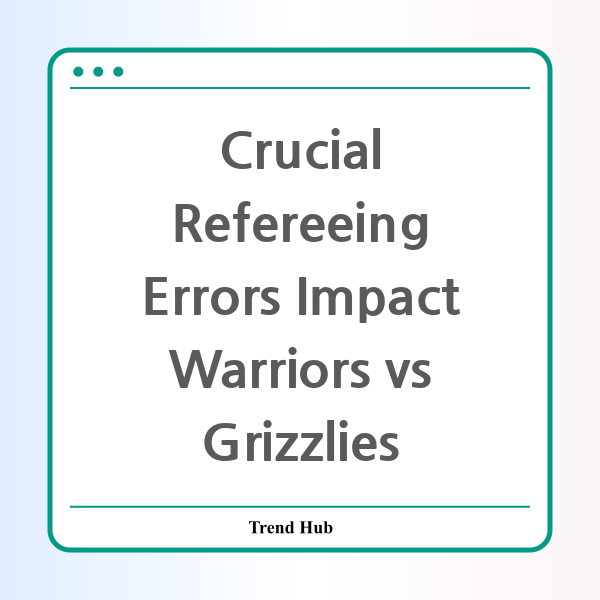* This website participates in the Amazon Affiliate Program and earns from qualifying purchases.

The NBA is no stranger to controversial officiating, and the recent play-in game between the Golden State Warriors and Memphis Grizzlies has reignited discussions about the role of referees in crucial matchups. With the stakes high and playoff implications on the line, the pressure on referees intensifies, and this game brought that pressure to the forefront. But did the officials during this high-stakes meeting drop the ball? Let’s dive into some key moments that led to a flurry of scrutiny regarding the officiating.
In the final moments of the game, the officiating crew made four pivotal errors that changed the landscape of the contest. According to the NBA's Last Two Minute Report, two incorrect calls were made, and notably, two serious non-calls went unpunished.
One of the initial calls that caught the attention of fans and analysts alike was a crucial personal foul on Podziemski during a well-timed block on Pippen Jr. with just 37 seconds remaining. The foul sent Pippen to the line, where he managed to sink one of two free throws, narrowing the Warriors' lead to just three points. This call raised eyebrows as it seemed Podziemski had made a clean defensive play, which, if ruled correctly, would have preserved the Warriors' advantage.
As the game reached its dramatic conclusion with 7.3 seconds left, chaos ensued once again when Curry appeared to have the ball knocked away by Pippen. Instead of awarding possession to Memphis, the referees adjudged the ball last touched by Curry. This misjudgment denied Memphis a chance for a potential game-winning shot, leaving fans questioning whether the referees fully grasped the situation.
However, not all the decisions were incorrect. The report did confirm that the referees made the right call on a five-second violation by Memphis during an inbounds play, underscoring that while some calls were erroneous, others were indeed justified.
One of the most significant non-calls occurred with 1:29 left in the game, when Draymond Green committed a foul on Pippen that would have given him his sixth personal foul. Without the whistle blown on Green, he was allowed to stay on the floor longer than he perhaps should have, ultimately leading to a further personal foul that took place after the game’s momentum had shifted again.
Adding to Memphis’ woes, Grizzlies center Edey’s crucial putback basket that cut the Warriors' lead to three points should have been ruled offensive goaltending due to his contact with the ball while it was in the imaginary cylinder above the rim. The failure to enforce this call only added to the frustrations that Memphis fans felt, given how closely contested the game was.
In summary, late-game officiating in the Warriors-Grizzlies match was marked by inconsistencies that may have swayed the final outcome. Both teams faced challenges from the referees, with two incorrect calls going against each team, but the way the game was managed left many wondering what could have been.
The NBA's play-in games are designed to bring forth exciting, competitive basketball, and while the Warriors emerged victorious and secured their playoff position, the Grizzlies have a legitimate case to feel aggrieved. They now face the daunting task of fighting for their postseason survival in a play-in game against another contender.
This match not only highlights the importance of accurate officiating but also raises questions about the potential impact of referee errors on the broader playoff picture. As we draw closer to the playoffs, it’s essential for officials to be at their best, as their decisions can critically affect teams’ destinies. Will the league take additional steps to ensure clearer and fairer officiating as the stakes continue to rise? Only time will tell.
* This website participates in the Amazon Affiliate Program and earns from qualifying purchases.